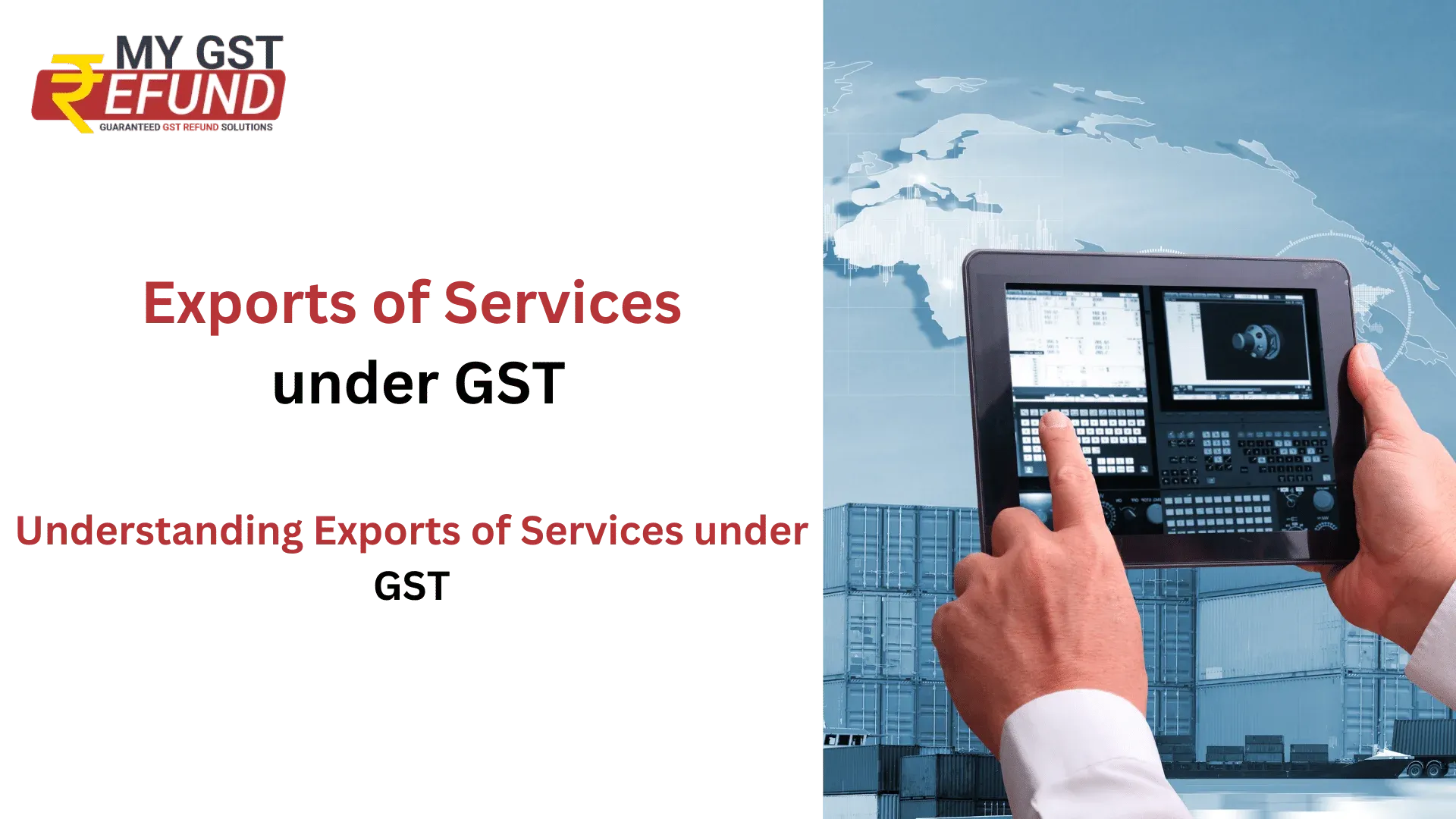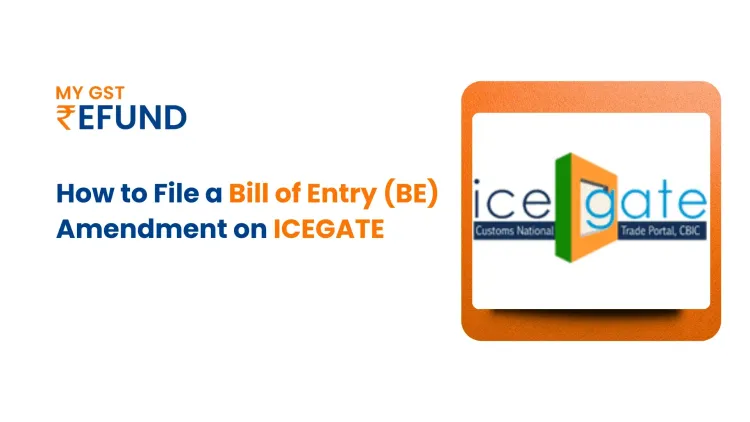Export of Services under GST: A Guide for Indian Exporters
Published on: Thu Mar 28 2024
Bio (Reveal/Hide)

Export of Services under GST: A Guide for Indian Exporters
The Goods and Services Tax (GST), implemented in India in 2017, revolutionized the indirect tax system. One of the key aspects of GST is its focus on promoting exports. This article delves into the nitty-gritty of Exports of Service under GST, covering everything an exporter needs to know.
What are the Exports of Services under GST?
Exports of services under GST are considered zero-rated supplies. This means that no GST is levied on the value of services exported from India to a recipient located outside India. This is a significant benefit for exporters, as it eliminates the tax burden on their exports and improves their competitiveness in the global market.
Benefits of Exporting Services under GST
Enhanced Competitiveness: Zero-rating of exports removes the tax component from the final price, making Indian service providers more competitive internationally.
Streamlined Refunds: GST simplifies the process of claiming refunds on input tax credit (ITC) for taxes paid on inputs and services used in providing the exported services. This reduces the working capital blockage for exporters. Boost to Exports: The ease of doing business under GST, with its focus on export promotion, has the potential to boost India's service exports significantly.
According to the Ministry of Commerce and Industry, India's service exports reached USD 210 billion in 2022-23, showcasing the growing importance of this sector in the Indian economy. Key service export categories include:
- Information Technology (IT) and Business Process Outsourcing (BPO)
- Telecommunications
- Financial Services, Professional Services (accounting, legal, etc.)
Place of Supply (POS) Rules for Services
Determining the place of supply (POS) is crucial for understanding whether a service is considered an export under GST. The POS rules for services are defined under Section 13 of the Integrated Goods and Services Tax Act (IGST Act), 2017. Here's a simplified breakdown:
POS outside India: If the recipient of the service is located outside India, the service is considered an export.
POS within India: If the recipient of the service is located within India, it is considered a domestic supply and is subject to GST.
Export of Services under GST without Payment of Tax
If you export services like IT, consulting, or design to clients outside India, you can export Services under GST without Tax payment. You must prepare the Letter of Undertaking (LUT) before submitting it to the GST department. The Letter of Undertaking enables you to make GST-free exports. Tax refunds are available for purchases that deliver exported services since you can reclaim the taxes paid for these necessary items.
The LUT option supports cost reductions and consistent cash flow since you avoid waiting for the GST refund. The lower speed and simplicity of this method attract numerous exporters of services. This benefit needs continuous use through yearly LUT filing and maintaining the required supporting documents. Using the Export of Services under GST without Payment of Tax gives your business strong market competencies.
Compliances for Export of Services under GST
To avail the benefits of zero-rated exports under GST, exporters must comply with certain procedures:
GST Registration: All exporters of services must be registered under GST.
Filing of Shipping Bill: A shipping bill, electronically filed with customs authorities, is mandatory to export services. Furnishing Letter of Undertaking (LUT) or Payment of IGST: Exporters have two options:
LUT: Exporters can file a Letter of Undertaking (LUT) with the jurisdictional tax authorities, undertaking to pay any applicable tax liabilities arising from the export. This allows them to avail of the zero-rated supply without upfront payment of IGST.
Payment of IGST with Refund: Exporters can choose to pay the IGST on the export and then claim a refund of the tax paid.
Claiming Refund of Input Tax Credit (ITC)
Exporters can claim a refund of ITC on the taxes paid on inputs and input services used in providing the exported services. This helps exporters recover the embedded taxes in their costs, improving their cash flow.
Documents Required for ITC Refund
- Invoice for the exported service
- Shipping bill evidencing the export
- Proof of payment of tax on the export (applicable only if IGST is paid upfront)
- Records of ITC claimed on inputs and input services used for the export
Example: Export of IT Services
Let's consider an example to illustrate the concept. Imagine an Indian IT company providing software development services to a client in the USA. Since the recipient is located outside India, the service is considered an export of services under GST. The IT company can export its service by:
Option 1 (LUT):
File a LUT with the GST authorities and provide the IT services without paying any GST upfront. They can claim ITC on the taxes paid on inputs used for the service development.
Option 2 (Payment and Refund):
Pay IGST on the value of the IT services and then claim a refund of the tax paid, along with evidence of export and ITC on inputs.
Important Points to Remember
Exporters must maintain proper records of exports, shipping bills, LUTs, and ITC claims for GST audits. The government may prescribe specific documentation requirements for claiming refunds on ITC related to exports. Consulting a tax professional is recommended to ensure compliance with the latest GST regulations for exports of services.
Read More: How to Start an Import and Export Business in India
Conclusion
Exporting services under GST offers several benefits, including zero-rated supplies and the ability to claim ITC refunds. This enhances the competitiveness of Indian service providers. Understanding key provisions such as GST registration, LUT, Place of Supply rules, and refund procedures is essential for maximizing these benefits. Compliance with these rules helps streamline the export process and supports the growth of India’s service export sector.
Frequently Asked Questions
Is GST Registration Compulsory for Export of Services?
As per Section 24, GST registration is compulsory for the inter-state supply of goods or services.
What is the GST Limit for Services?
The GST threshold for services is ₹20 lakhs (₹10 lakhs for special category states) in annual turnover. However, this limit does not apply if the service provider falls under the conditions specified in Section 24.
Is the Reverse Charge Mechanism (RCM) Applicable to the Export of Services?
No, RCM is not applicable to the export of services.
- Examples of Service Exports
- IT and BPO services
- Financial services
- Tourism services
- Professional services (legal, accounting)
- Educational services
- Health services
- Advertising services
- Intermediate services
Is LUT Mandatory for Export of Services?
No, a Letter of Undertaking (LUT) is not mandatory. However, it is recommended to avoid paying IGST on exports.
Related Posts






